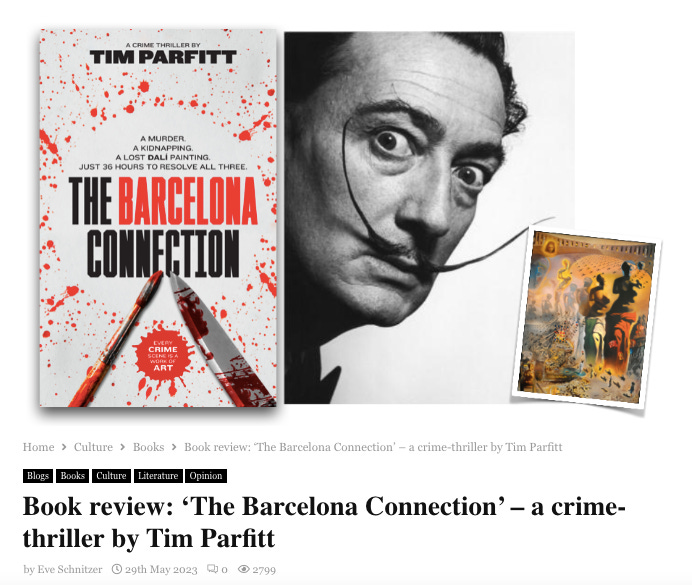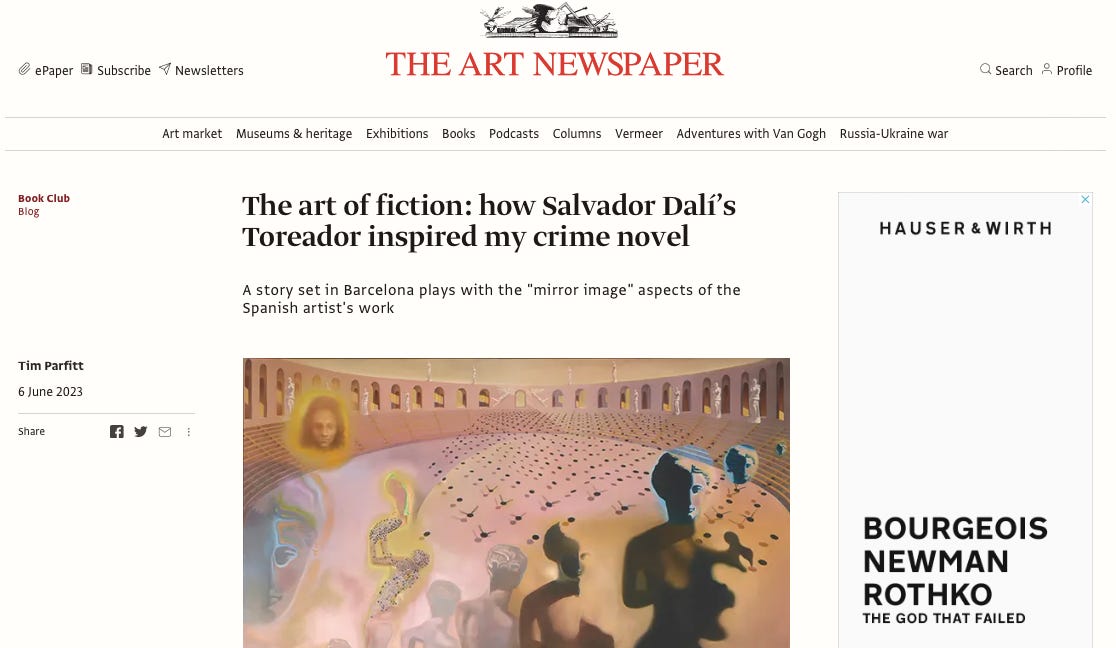One of the stories in Spain that caught my attention this week is that of 14 airport workers arrested in Tenerife for allegedly stealing around €2 million worth of goods, including €13,000 in cash, from tourists’ checked-in luggage over a period of several months. 20 others are still under investigation.
The Sur-Reina Sofía de Tenerife airport in the Canary Islands handles about 11 million passengers a year, most of them European tourists. Police started to investigate matters after an increase in passenger complaints about items missing from their luggage.
The thefts occurred as baggage was being placed in the aircrafts’ hold. When the suitcases were transferred to the planes, they were loaded and unloaded at a slower pace and with greater distance between them. Inside the hold, thieves forced open the bags out of sight, took out valuables and then shut them again, leaving the bags with the appearance of not being tampered with.
According to the Guardia Civil’s statement, each alleged member of the gang was in charge of one of the actions of the crime: choosing the flight, hiding the stolen effects, removing them from the airport facilities, selling them to jewellery dealers or through the internet, and the distribution of profits.
The police carried out several searches, both at the lockers of the airport workers and in their private vehicles and homes. They seized 29 luxury watches, 120 items of jewellery, 22 high-end cell phones and assorted electronic devices. The suspects had sold many other items online or in local stores, police believe.
It reminded me of an ingenious method of stealing from luggage that happened here in Catalonia back in June 2011 … ingenious if you weren’t a victim of it, of course.
The Catalan police, the Mossos d’Esquadra, based at Girona-Costa Brava Airport, had received complaints that several thefts had been taking place from suitcases during bus journeys from Girona airport to Barcelona.
Receiving a tip-off that a passenger on a bus about to leave for Barcelona had left a suspicious suitcase in the vehicle’s hold, the police found a man ‘folded like a circus contortionist’ inside the case. He carried a cell phone and was equipped with a small backpack, a headlamp and a sharp object to open zippers or locks.
After detaining the passenger and the man inside the suitcase, the police unravelled their scam:
One of them would buy a bus ticket to go from Girona airport to Barcelona. Then they’d go into an airport bathroom and the other man, apparently 1.78 metres tall, would get inside the 90 x 50 cm suitcase. The one who’d bought the bus ticket would then drag the suitcase to the bus and put it in the hold alongside other passengers’ luggage.
During the 90-minute journeys, the ‘contortionist’ would come out of the suitcase and start searching for valuables from other luggage to put into a smaller backpack. He’d put his headlamp on so that he could use both hands, and then once he’d taken what he wanted, he’d get back inside the suitcase until his companion took it out when they reached Barcelona.
So … just watch your luggage if you’re travelling to Spain.
Anyway, the other big story this week was the leader of the far-right Vox party, Santiago Abascal, saying that there would come a time when ‘the Spanish people would want to string up (PM Pedro Sánchez) by the feet’ …
I spoke about this and other Spanish news on the radio this week, in my fortnightly discussion with Giles Brown on Talk Radio Europe. Below is the chat from Wednesday 13 December if you’re interested.
Also on Wednesday, I took part in a discussion in my local town of Sitges, as part of L’Eco newspaper’s ‘Repensar Sitges’ (‘Rethink Sitges’) Conference - the sixth time they’ve run it. The topic was whether Sitges is, or comes across as, a closed or open town, specifically for international residents and visitors. If you’re interested, and if you can understand Spanish (and some Catalan) - or especially if you can understand my dodgy Spanish - then here’s the video of the discussion:
2023 has been a great year - and 2024 is going to be even better. I will be blogging here again from Sunday 7 January. Until then, to all of you who have subscribed or read parts of this blog and newsletter since I launched it in April with the publication of The Barcelona Connection, I wish you, your families and loved ones a wonderful Christmas and a very healthy and happy New Year.
The Barcelona Connection - Research
Benjamin’s thoughts and reaction to the toddler on the slow train to Figueres in Chapters 50, 52 and 57 provoked a few comments from readers about his character. One reader didn’t think that Benjamin should have reacted (or should have been thinking) about the snivelling kid in the way he did - and that he ought to be ‘above’ that. Another (actually a friend) also thought it was ‘out of character’ and that it was more likely an incident that had happened to me, personally. Well, yes, he was right - it did - although not on a train to Figueres. I encountered a ‘Theo’s brother’ incident on a train from Liverpool Street to Ipswich in the UK once - but enough said about that.
I once got a very slow train from Barcelona to Figueres by mistake. I had intended to get a fast train, but - like Benjamin - I jumped on the first train that was going there. It stopped everywhere. I decided to use it for the book, mainly because I needed a time lapse before Benjamin finally arrived. At the end of Chapter 57, he steals (or ‘borrows’) a bicycle that is propped up near a fountain in the little plaza opposite the station. Here are some random images from one of my trips to Figueres, when I was carrying out research for the book. In my next blog (on 7th January), I’ll write about Conso, the Dalí Museum in Figueres itself, and Benjamin going inside to view ‘The Face’ …
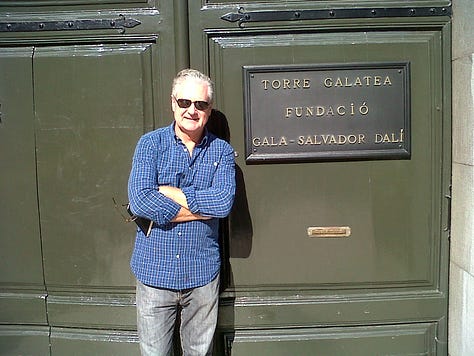
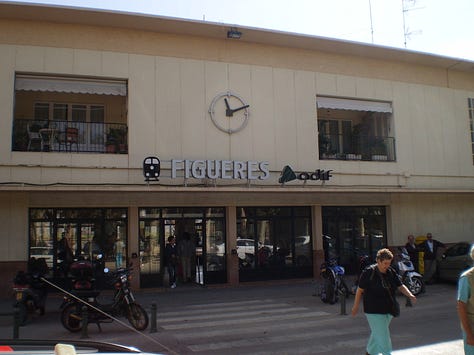
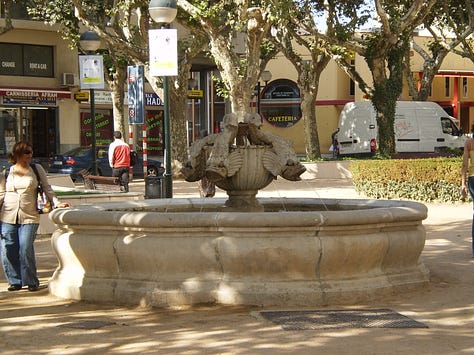
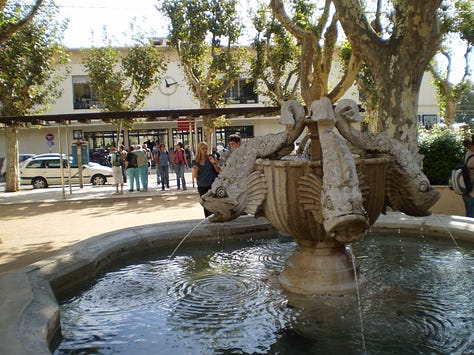
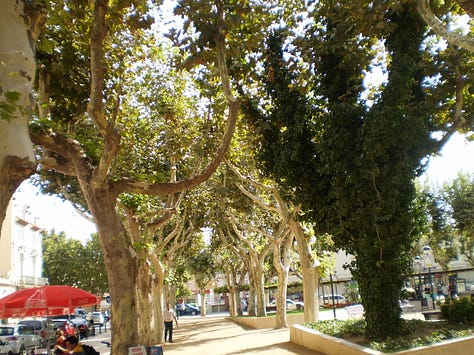
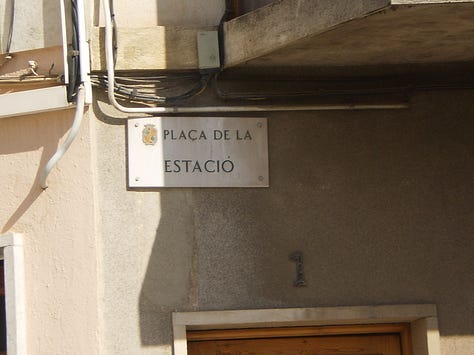


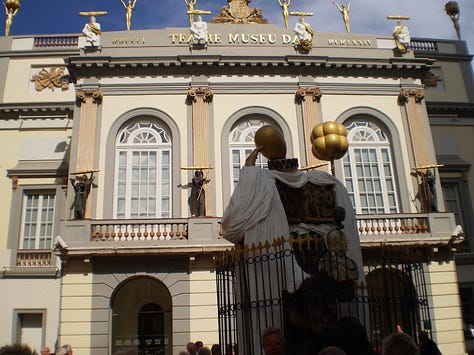
Previous links to my research notes are here:
Chapters 48 and 51 in Letter from Spain #34 (G20 Spouse Party, museum visits and ‘art attacks’)
Chapters 48 and 51 in Letter from Spain #33 (Picasso Museum).
Chapters 39 and 42 in Letter from Spain #31 (Hotel Arts & Port Olímpic).
Chapter 36 in Letter from Spain #29 (Hotel Arts & Port Olímpic).
Chapter 29 in Letter from Spain #28 (Nîmes to Barcelona and tollgates).
Chapters 28 and 32 in Letter from Spain #27 (Pedralbes and Jaume, the Marquès de Guíxols).
Chapter 26 in Letter from Spain #26 (pijos and Beltrán Gómez de Longoria).
Chapter 25 (again) in Letter from Spain #25 (Benjamin’s thoughts on Púbol, Figueres and Port Lligat-Cadaqués).
Chapter 25 in Letter from Spain #23 (Benjamin and Elena on the Passeig Marítim).
Chapters 22 and 24 in Letter from Spain #22 (Plaça Sant Jaume & Nîmes).
Chapter 21 in Letter from Spain #21 (the Museu Nacional d’Art de Catalunya - MNAC).
Chapter 18 in Letter from Spain #20 (Nîmes).
Chapter 16 in Letter from Spain #19 (Marta Soler visiting the offices of La Vanguardia).
Chapter 15 in Letter from Spain #18 (Sants, Les Corts and the Plaça de la Concòrdia).
Chapter 14 in Letter from Spain #17 (introducing Inspector Vizcaya and Marta Soler).
Chapter 13 in Letter from Spain #16 (the painting - the possible study of The Hallucinogenic Toreador by Salvador Dalí).
Chapters 10 and 12 in Letter from Spain #15 (Isabel Bosch and Lieutenant Trias).
Chapters 8 and 11 in Letter from Spain #14 (Benjamin at Girona Airport and finding the Marqueses’ home in La Bisbal).
Chapter 7 in Letter from Spain#12 (Séverin and Jürgen).
Chapter 5 in Letter from Spain#11 (Elena in Girona).
Chapters 3-4 in Letter from Spain#9 (Marcos Constantinos in Hampstead, plus Benjamin at the UEA & Stansted).
Chapter 2 in Letter from Spain#8 (the home of the Marqueses de Guíxols, not far from La Bisbal d’Empordà).
Chapter 1 in Letter from Spain#7 (Benjamin waking up at the service station).
The Barcelona Connection - Reviews, News & Events
Links to reviews & articles
A review of The Barcelona Connection by Michael Eaude has been published in the October edition of Catalonia Today.
‘Short, fast-moving scenes and the deft joining of two completely different plots … the novel is not just breathlessly rapid and action-packed, but overflows with humour and satire.’
‘The excellent plotting, the local knowledge, the surreal humour, the political satire and the speed of events … it’s an admirable and very readable crime novel.’
Here’s the link for a review of The Barcelona Connection by Dominic Begg that came out in La Revista, a publication of the British-Spanish Society.
‘The Barcelona Connection is a fast-moving page-turner with a helter-skelter plot.’
‘The background to this thriller is realistic and familiar to those who know Barcelona well. It’s a world of cynical, ambitious politicians; civil servants promoted via enchufe; friction between Spanish and Catalan investigators; disruptive anti-capitalist activists; bumbling US dignitaries and security guards; the continuing influence of old supporters of Franco; the soulless 21st century, exemplified by apartment hotels seemingly without human staff-members …’
Here’s a link to a review of the book by Eve Schnitzer published by the Spain in English online newspaper.
‘Tim Parfitt very cleverly weaves together two parallel though quite different stories, set against the background of a contemporary Barcelona that is even busier than usual with major international meetings.’
‘Two plot lines interweave, with some highly ironic as well as suspenseful results … this book has a lot to offer the reader, from pure entertainment to solid information and, possibly, a fuller understanding of the complexities of Spain and Catalonia in particular.’
Here’s the link to an article I was asked to write for The Art Newspaper about my research on Salvador Dalí.
You can also click here for the latest reviews on Amazon, as well as on Goodreads and at Barnes & Noble.
The book is available on Amazon or you can also click here to choose where else to order your copy from. It can also be ordered from any bookshop simply by giving the ISBN number: 978-1-7393326-1-7.
You can also click here for the Kindle edition of A Load of Bull - An Englishman’s Adventures in Madrid.
For professional enquiries and foreign rights for The Barcelona Connection, please contact my agent Justyna Rzewuska at the Hanska Literary & Film Agency.






